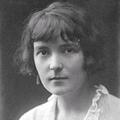Chapter 1.IV. "Wait for me, Isa-bel! Kezia, wait for me!" There was poor little Lottie, left behind again, because she found it so fearfully hard to get over the stile by herself. When she stood on the first step her knees began to wobble; she grasped the post. Then you had to put one leg over. But which leg? She never could decide. And when she did finally put one leg over with a sort of stamp of despair—then the feeling was awful. She was half in the paddock still and half in the tussock grass. She clutched the post desperately and lifted up her voice. "Wait for me!" "No, don't you wait for her, Kezia!" said Isabel. "She's such a little silly. She's always making a fuss. Come on!" And she tugged Kezia's jersey. "You can use my bucket if you come with me," she said kindly. "It's bigger than yours." But Kezia couldn't leave Lottie all by herself. She ran back to her. By this time Lottie was very red in the face and breathing heavily.
"Here, put your other foot over," said Kezia. "Where?" Lottie looked down at Kezia as if from a mountain height.
"Here where my hand is." Kezia patted the place.
"Oh, there do you mean!" Lottie gave a deep sigh and put the second foot over.
"Now—sort of turn round and sit down and slide," said Kezia. "But there's nothing to sit down on, Kezia," said Lottie. She managed it at last, and once it was over she shook herself and began to beam.
"I'm getting better at climbing over stiles, aren't I, Kezia?" Lottie's was a very hopeful nature. The pink and the blue sunbonnet followed Isabel's bright red sunbonnet up that sliding, slipping hill. At the top they paused to decide where to go and to have a good stare at who was there already. Seen from behind, standing against the skyline, gesticulating largely with their spades, they looked like minute puzzled explorers.
The whole family of Samuel Josephs was there already with their lady-help, who sat on a camp-stool and kept order with a whistle that she wore tied round her neck, and a small cane with which she directed operations. The Samuel Josephs never played by themselves or managed their own game. If they did, it ended in the boys pouring water down the girls' necks or the girls trying to put little black crabs into the boys' pockets. So Mrs. S. J. and the poor lady-help drew up what she called a "brogramme" every morning to keep them "abused and out of bischief." It was all competitions or races or round games. Everything began with a piercing blast of the lady-help's whistle and ended with another. There were even prizes—large, rather dirty paper parcels which the lady-help with a sour little smile drew out of a bulging string kit. The Samuel Josephs fought fearfully for the prizes and cheated and pinched one another's arms—they were all expert pinchers. The only time the Burnell children ever played with them Kezia had got a prize, and when she undid three bits of paper she found a very small rusty button-hook. She couldn't understand why they made such a fuss.... But they never played with the Samuel Josephs now or even went to their parties. The Samuel Josephs were always giving children's parties at the Bay and there was always the same food. A big washhand basin of very brown fruit-salad, buns cut into four and a washhand jug full of something the lady-help called "Limonadear." And you went away in the evening with half the frill torn off your frock or something spilled all down the front of your open-work pinafore, leaving the Samuel Josephs leaping like savages on their lawn. No! They were too awful.
On the other side of the beach, close down to the water, two little boys, their knickers rolled up, twinkled like spiders. One was digging, the other pattered in and out of the water, filling a small bucket. They were the Trout boys, Pip and Rags. But Pip was so busy digging and Rags was so busy helping that they didn't see their little cousins until they were quite close. "Look!" said Pip. "Look what I've discovered." And he showed them an old wet, squashed-looking boot. The three little girls stared.
"Whatever are you going to do with it?" asked Kezia.
"Keep it, of course!" Pip was very scornful. "It's a find—see?" Yes, Kezia saw that. All the same.... "There's lots of things buried in the sand," explained Pip. "They get chucked up from wrecks. Treasure. Why—you might find—" "But why does Rags have to keep on pouring water in?" asked Lottie.
"Oh, that's to moisten it," said Pip, "to make the work a bit easier. Keep it up, Rags." And good little Rags ran up and down, pouring in the water that turned brown like cocoa.
"Here, shall I show you what I found yesterday?" said Pip mysteriously, and he stuck his spade into the sand. "Promise not to tell." They promised.
"Say, cross my heart straight dinkum." The little girls said it.
Pip took something out of his pocket, rubbed it a long time on the front of his jersey, then breathed on it and rubbed it again.
"Now turn round!" he ordered.
They turned round.
"All look the same way! Keep still! Now!" And his hand opened; he held up to the light something that flashed, that winked, that was a most lovely green.
"It's a nemeral," said Pip solemnly. "Is it really, Pip?" Even Isabel was impressed.
The lovely green thing seemed to dance in Pip's fingers. Aunt Beryl had a nemeral in a ring, but it was a very small one. This one was as big as a star and far more beautiful.

